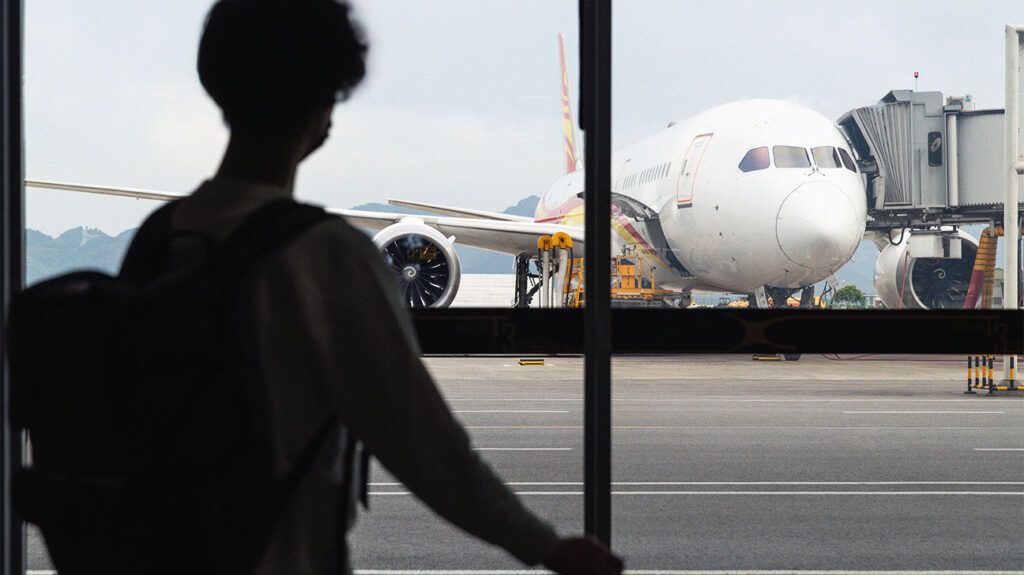Flying does not usually cause problems for people with tinnitus. However, bringing distractions, managing stress, and sitting in quieter parts of the cabin may help ease any ear discomfort.
Flying can involve exposure to loud noises and quick changes in air pressure and altitude. Some people may find that these symptoms cause or worsen tinnitus symptoms.
However, others may find that plane noise actually masks their tinnitus.
If flying worsens tinnitus, people can try management strategies to help relieve symptoms. They can also speak with a healthcare professional for information about long-term treatment options.

According to the charity Tinnitus UK, flying does not cause issues for most people with tinnitus. Any worsening of symptoms is likely to be minor and temporary.
However, a 2019 article suggests that “airplane ear,” also known as barotitis media, ear barotrauma, or aerotitis media, is a common issue when flying and may occur due to fast changes in air pressure and altitude.
Tinnitus may occur in severe cases of airplane ear, and chronic tinnitus may develop as a rare complication of this condition.
However, this suggestion comes from older research looking at flight attendants and pilots, so repeated exposure to pressure changes and airplane ear episodes may play a role in their complications.
Ultimately, further research is necessary to understand whether there is a link between flying and tinnitus, including whether a potential link is due to repeated exposure.
Noise exposure
However, this may be unlikely from a single flight, and the noise will not typically worsen preexisting tinnitus in the immediate flight period. More research is necessary to understand if flying may worsen or cause tinnitus.
People with tinnitus may find the following tips helpful in minimizing their symptoms when flying:
Bring distractions
The United Kingdom’s National Health Service suggests that focusing on tinnitus can worsen symptoms. In these cases, preparing distractions to bring on the flight may help reduce symptoms.
Potential ideas for distractions include the following:
- completing a puzzle book
- listening to music or a podcast
- talking with other passengers
- bringing a notebook to draw or write in
- watching an in-flight film, if available
- playing card games
- reading a book
Balance ear pressure
Tinnitus
Tinnitus UK suggests taking steps to equalize pressure inside and outside of the ear may help people with tinnitus feel more comfortable. This may involve the following steps:
- regularly swallowing and yawning to pop the ears
- chewing gum
- sucking on a hard candy
- staying awake during takeoff and landing
- treating colds or upper respiratory infections before flying
Consider ear protection
A 2022 paper found that cabin noise in five different aircraft types does not exceed the Occupational Safety and Health Administration’s permissible limits of noise exposure for humans.
These limits range from 90 decibels (dB) for 8 hours to 115 dB for 15 minutes. The paper’s authors found that the noise levels in the five aircraft cabins were below this limit, but noise levels were typically louder during takeoff and landing.
Loud noise exposure
However, some people may find tinnitus more noticeable when there is no background noise, so ear protection may not be suitable for everyone. If this is the case, sitting in quieter parts of the cabin, such as toward the front, may help.
Try to manage stress
Stress
- deep breathing exercises
- mindfulness
- meditation
- journaling
- thinking about things they are grateful for
- talking with other people
Learn some stress reduction strategies.
People with tinnitus can speak with a healthcare professional before flying to discuss whether any other remedies might help them manage their symptoms.
People may also benefit from speaking with a healthcare professional if flying causes or worsens symptoms of tinnitus.
Although there is
- cognitive behavioral therapy
- treatments for co-occurring mental health issues
- sound-masking devices
- hearing aids
Does tinnitus disqualify someone from flying?
Tinnitus does not prevent someone from being able to fly commercially, and most people with tinnitus experience no issues when flying.
However, the Aircraft Owners and Pilots Association highlights that tinnitus among pilots may require review by the Federal Aviation Administration, particularly if it links with another health condition.
Does high altitude affect tinnitus?
A 2019 paper suggests that fast changes in altitude and air pressure may cause “airplane ear,” which can involve tinnitus in severe cases and may lead to chronic tinnitus.
What should people avoid if they have tinnitus?
Certain factors can worsen tinnitus. People with the condition should try to reduce stress and avoid exposure to loud noise. Total silence may also make tinnitus more noticeable for some people.
Most people with tinnitus do not have issues with flying. However, some individuals may find that cabin noise levels and sudden or fast changes in air pressure and altitude may cause or worsen tinnitus symptoms.
To help manage tinnitus on flights, people can bring distractions, sit in quieter parts of the cabin, and try stress management strategies. Some people may also find that regular swallowing helps ease ear discomfort.
If flying causes or worsens tinnitus, people can speak with a healthcare professional to discuss treatments and management strategies.


